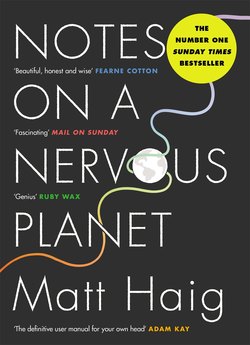Читать книгу Notes on a Nervous Planet - Matt Haig - Страница 28
На сайте Литреса книга снята с продажи.
ОглавлениеWays the world is changing that aren’t entirely good
THE WORLD MAY have progressed fast in some ways, but the speed of change has not made us all very calm. And some changes, particularly those fuelled by technology, have been faster than others. For instance:
– Politics. The polarisation of the political right and left, fuelled in part by our social media echo chambers and gladiatorial combat zones, where compromise and common ground and objective truth seem like ever more outdated concepts. A world where, in the words of American sociologist Sherry Turkle, ‘we expect more from technology and less from each other’. Where we need to share ourselves, simply to be ourselves. There have been good aspects to this change. A lot of good causes – including mental health awareness – have had their profile raised thanks to the viral nature of the internet. But, of course, not everything has been so good. The rise of fake news on social media, of politically malicious Twitter bots, and of massive online privacy breaches, has already shaped and steered our politics in strange and irreversible directions.
– Work. Robots and computers are taking people’s jobs. Employers are taking people’s weekends. Employment is becoming a dehumanising process, as if humans existed to serve work, rather than work to serve humans.
– Social media. The socialisation of media has rapidly taken over our lives. For those of us using it, our pages on Facebook, Twitter and Instagram are magazines of us. How healthy can that be? We are seeing ever more frequent ethical breaches, such as Cambridge Analytica’s illicit harvesting of millions of psychological profiles through Facebook and the company’s use of these to influence electoral results. Then there are other serious psychological concerns. To be constantly presenting ourselves, and packaging ourselves, like potatoes pretending to be crisps. To be constantly seeing everyone else looking their best, doing fun things that we are not doing.
– Language. The English language is changing faster than at any time in history, according to research carried out by University College London. The growth in text speak and initialisms and acronyms and emojis and gifs as communication aids shows how technological advancements influence language (think also of how, many centuries ago, the printing press led to standardisations of spelling and grammar). So, it’s not just what people are saying but how they’re saying it. Many millions of people now have more text message conversations than face-to-face ones. This is an unprecedented shift that has taken place within a single generation. It isn’t a bad thing in itself, but it is definitely a thing.
– Environment. Some changes, though, are clearly bad. Straightforwardly, horrendously bad. The changes to our planet’s environment are so grave that some scientists have put forward the idea that we – or our planet – have entered a fundamentally new phase. In 2016, at the International Geological Congress in Cape Town, leading scientists decided that we were leaving the Holocene epoch – one marked by 12,000 years of stable climate since the last Ice Age – and entering something else: the Anthropocene age, or ‘new age of man’. The massive acceleration of carbon dioxide emissions, sea-level rises, the pollution of our oceans, the increase in plastic (plastic production has multiplied 20 times since the 1960s, according to the World Economic Forum), the rapid extinction of species, deforestation, industrialised farming and fishing, and urban development mean for those scientists that we have arrived at a new interval of Earth time. So, modern life is, basically, slowly killing the planet. Small wonder that such toxic societies can damage us, too.
